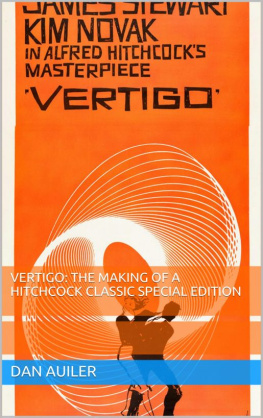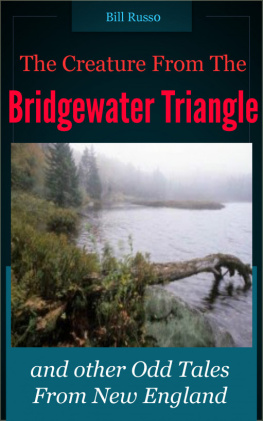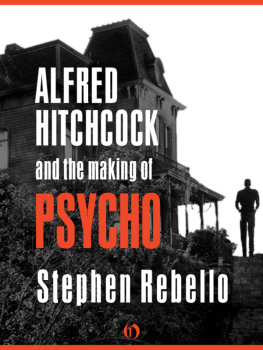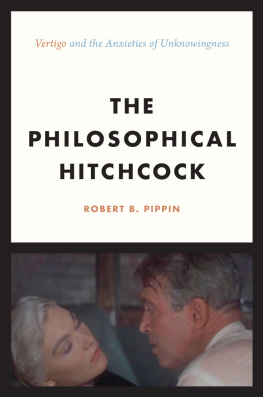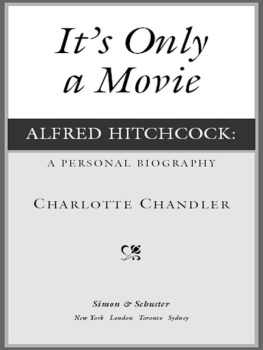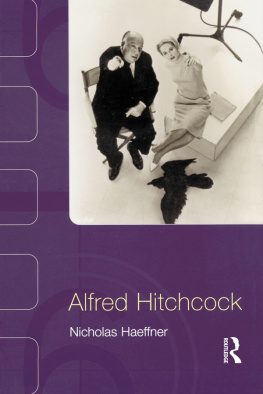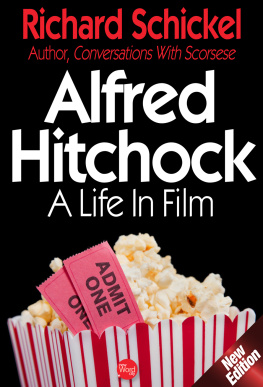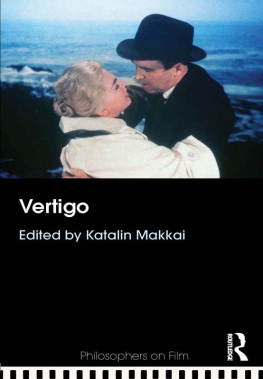VERTIGO:
The Making of a HitchcockClassic
by Dan Auiler
Foreword from Martin Scorsese
Copyright 2013 Dan Auiler
SmashwordsEditions
Foreword copyright 1998 MartinScorsese
Vertigo images used with permission,all rights reserved the Alfred Hitchcock Estate and UniversalStudios
Publication history
First Edition 1998 St. Martin's Press
Paperback 2001 St. Martin's Press Griffin
UK Editions 1998 Titan Books
This special edition is published bythe author and has substantial changes from the originalpublications
First Edition
Dedication
To Rose and Maya
Smashword2011 edition
Dedication
To all of us who stand in the tower
Preface
What do you think about theprominence that Vertigo has assumed for your Europeancritics?
H: I think they understoodthe complexities of the situation.
But do you agree with thoseamong them who say the film refers to you....?
H: No, there's nothing inthat.
(Alfred Hitchcock to CharlesThomas Samuels, 1972)
...I think that in allartistic domains we attempt to create an emotion. The importance ofa work of art, no matter what sort, is to evoke a reaction. Itdoesn't matter what sort of reflex is stimulated. As soon as onesays "I like" or "I hate" that signifies that one is no longerindifferent. I very much like the story of the young couple in amuseum of modern art. They stop, perplexed, in front of an abstractpainting. Suddenly a hand with a finger pointing at them emergesfrom the frame and says, "I don't understand youeither."
(Hitchcock to NicolettaZalafi, 1972)
When St Martin's published this book in1998, Vertigo was still very much a niche film. Loved by the fewwho had seen it. The book's success was that lucky convergence ofauthor, timing and cultural phenomenon. The book was conceived andcompleted as Harris and Katz were finishing their restoration ofthe film. It was a lucky coincidence. When I arrived at theAcademy's research library, I knew that I had to have a project tojustify seeing any of Hitchcock's personal files. I had decidedthat I needed to know everything there was to know about Vertigo.The film had intrigued, perplexed, bothered. I needed to workthrough what about this film in its inception might inform myprofound reaction to each viewing of the film.
15 years on, the film has been votedthe best film ever made by the international film critics polled bythe British Film Institute and published once a decade by Sight andSound. Vertigo unseated Orson Welles' Citizen Kane which had heldthe top spot since the 1960s. Vertigo did not even make the listuntil the 1980s.
Late July 2012, the BBC called with thenews that the BFI was likely to announce the prestigious list withVertigo at the top on Aug. 1st. I was asked to come into Hollywoodto do an interview about the choice, this film. I didn't go. Iwasn't sure what to say.
And, as the day arrived, as Vertigoarrived, its most profound chronicler left.
Chris Marker, whose work is discussedin the book, died on the eve of Vertigo's ascendancy. Hisdeparture, the film's arrival like a time confused dance of theinsane memory he describes in the Vertigo sequence of San Soliel.Marker understood Vertigo.
Robin Woods understood also and Woodsis gone, too. These two men were my guides to that dreadful climbup the tower. They now rise as shadows to encourage. Toprovoke.
Vertigo, its profound nature, itsabsurd success, this book can only run at, fail, and then makeanother run, on and on. No book can explain or pin down thequickening that makes a masterpiece.
In this special edition, I have mademany corrections, added some details, tweaked statements that wereonce true and added back in much of the art that was in the St.Martin's edition. It is the best eBook version possible of theoriginal. The book will always be a thing of beauty impossible torecreate in the virtual world.
I'm certain that Hitchcock would behonored, touched even, by Vertigo's success today. But I'm certainhe would also be speechless at this turn of events. Hitch, Alma,they too stand in that tower's dark corner. Those left living,well, we stand in wonder still.
Dan Auiler, 2013
To Chris Marker and RobinWoods
They took notice. We takenotice.
FOREWORD
It's difficult to put into wordsexactly what Vertigo means to me as both a film lover and as afilmmaker. As is the case with all great films, truly great films,no matter how much has been said and written about them, thedialogue about it will always continue. Because any film as greatas Vertigo demands more than just a sense of admiration-it demandsa personal response.
A good place to start is its completesingularity. Vertigo stands alone as a Hitchcock film, as aHollywood film. In fact, it just stands alone, period. For such apersonal work with such a uniquely disturbing vision of the worldto come out of the studio system when it did was not justunusual--it was nearly unthinkable. Vertigo was and continues to bea real example to me and to many of my contemporaries, in the sensethat it demonstrates to us that it's possible to function within asystem and do work that's deeply personal at the sametime.
Vertigo is also important tome-essential would be more like it--because it has a hero drivenpurely by obsession. I've always been attracted in my own work toheroes motivated by obsession, and on that level Vertigo strikes adeep chord in me every time I see it. Morality, decency, kindness,intelligence, wisdom--all the qualities that we think heroes aresupposed to possess-desert Jimmy Stewart's character little bylittle, until he is left alone on that church tower with the bellstolling behind him and nothing to show but his humanity.
Whole books could be written about somany individual aspects of Vertigo--its extraordinary visualprecision, which cuts to the soul of its characters like a razor;its many mysteries and moments of subtle poetry; its unsettling andexquisite use of color; its extraordinary performances by Stewartand Kim Novak-whose work is so brave and emotionally immediate--aswell as the very underrated work of Barbara Bel Geddes. And that'snot to mention its astonishing title sequence by Saul Bass or itstragically beautiful score by Bernard Herrmann, both absolutelyessential to the spirit, the functioning, and the power ofVertigo.
Of course, we can now hear Herrmann'sscore with a clarity and breadth that it's never had before, thanksto Bob Harris and Jim Katz, the men who worked on the beautiful,painstaking restoration of Vertigo. I'm happy that the FilmFoundation was able to play a part in making this important workpossible, and I'd like to thank Universal and Tom Pollock forallowing it to go forward and, of course, I'd like to thank theAmerican Film Institute for their invaluablecontributions.
-MARTIN SCORSESE
1998
INTRODUCTION (1998edition)
Why does Vertigo affect us sodeeply?
Why isn't Alfred Hitchcock's 1958psychological thriller, just coming off its third major rereleasein four decades, and available in gorgeously restored home-videoeditions, just another "Hitchcock and bull story," as Timecallously described it upon its initial release?
Doesn't that description better fit theother films Hitchcock created during his last great period? Why?Because Vertigo, like other films that reach somewhere within usand grab us firmly by the entrails, is not the typical Hitchcockfilm, even as it represents the highest realization of so many ofthe director's career preoccupations.
Seen today, Vertigo can seem like thebest of films and the worst of films: At moments throughout, itsimages shimmer with an incandescent beauty that few films inhistory could pretend to match, even as othermoments---awkwardnesss in the script, longueurs in thestorytelling---induce discomforts not originally intended by thedirector or his crew. Vertigo is not the perfect, pure cinema ofRear Window. Yet who is haunted, dogged, pursued by Rear Window? IfHitchcock, as the critic Robin Wood has argued, is the cinema'sShakespeare, then Vertigo is his Macbeth. Not in theme, plot, orstructure, perhaps, but in its status as a flawed gem---whoseimperfections somehow make the work all the more effective. Macbethdoes not possess the perfect unity and exquisite poetry of AMidsummer Night's Dream, but surely this terrible couple's anguishmoves us far more deeply than the foolish lover's lament. Vertigois a classic of the heart-Hitchcock's and ours. It is a film thatwrites directly on our souls. Who knows the consequences ultimatelyof such art? I don't feel damaged after watching the film, asScottie so painfully and permanently is at its conclusion. What Ido know is that I've seen and felt something painfullytrue.
Next page
